Recycling Antarctica
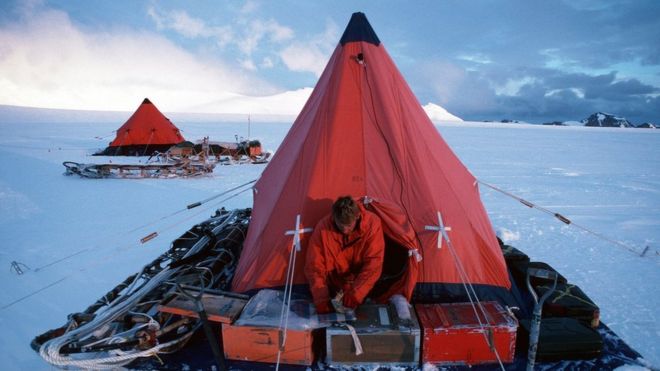 Pete Bucktrout/BAS
Pete Bucktrout/BAS
Picture a wide snowy expanse as far as the eye can see, edged by mountains on one side, and an iceberg-filled sea on the other.
That is the view from the Rothera Research Station on Adelaide Island, off the coast of mainland Antarctica.
The base is the largest of three run by the British Antarctic Survey (BAS) in the British Antarctic Territory.
Rothera is self-sufficient - it has a laboratory, offices, workshops, accommodation, a canteen, TV rooms, a surgery, a runway and hangar for aircraft, and a wharf to receive ships.
In winter, when the temperature can plummet to -20C, only 20 people stay on base. But during the Antarctic summer, when visibility and weather conditions are less severe, up to 120 staff are stationed there from October to May.
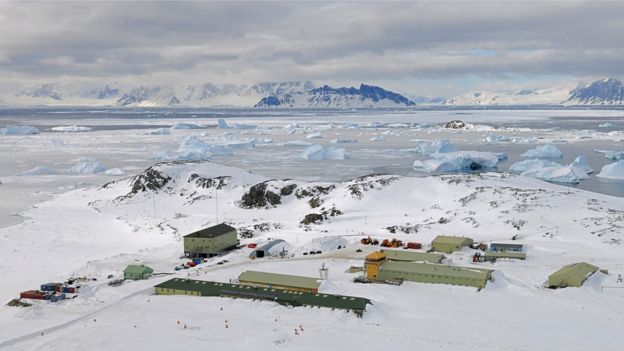 Pete Bucktrout/BAS
Pete Bucktrout/BAS
With all 30 countries that have a presence in Antarctica following strict rules to not disturb natural ecological systems, waste removal and recycling is a very serious business at Rothera.
Over the last five years, the BAS - a governmental body - has recycled between 81-88% of the waste produced at its research stations.

Circular Economy
The BBC's Circular Economy series highlights the ways we are designing systems to reduce the waste modern society generates, by reusing and repurposing products.
- The Swedish wasteland that's now a sustainability star
- Would you rent rather than buy your clothes?
- Will we ever get self-healing smartphones?
- Why 12 is the magic number when it comes to composting

At Rothera, as project support coordinator and base general assistant, waste management is a key part of Craig Nelson's job.
"Each day varies, but normally the job will take till 6pm in the evening, and even then you might be required to do even longer hours depending on flights," he says.
"Planes come back in the evening until midnight, and you'd be expected to help out, unload the aircraft, sort out the equipment, take it to the necessary places, and the waste as well."
All waste at the base is sent to a metal hut called the Miracle Span. And in domestic areas of the station, there are recycling bins for glass, paper, cardboard, plastic and cans.
Waste generated by research missions also has to be sorted; the BAS recycles everything from batteries, tetra packs, IT equipment, toner and inkjet cartridges, to wood, scrap metal, rope and textiles.
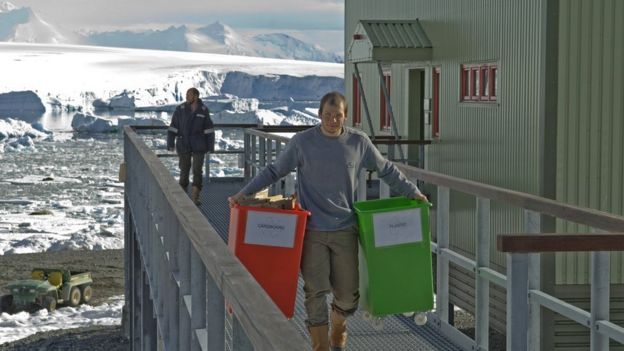 Pete Bucktrout/BAS
Pete Bucktrout/BAS
"[Our] colleagues in the Antarctic are incredibly resourceful and very good at repairing and reusing materials rather than just consigning them to be recycled," says Rachel Clarke, head of the environment office at BAS.
"For example, at Rothera there are chairs made from old skis, tables made from cable drums - and I think a wedding dress has been made from an old tent," she says.
To prevent the accidental introduction of insects or parasites, staff cannot bring their own food to the station - it has to be vetted and specially packed to reduce extraneous packaging, and meat comes deboned.
The station reduces food wastage by using odds and ends in soups, or reheating leftovers. What food cannot be recycled is incinerated on site together with medical waste.
Everything that can be recycled is compressed using a compactor and placed in super strong flexible intermediate bulk container (FIBC) bags.
These bags can be safely left on the wharf in the open for extended periods, until ships are able to pick them up and bring them back to the UK, once every two to six months.
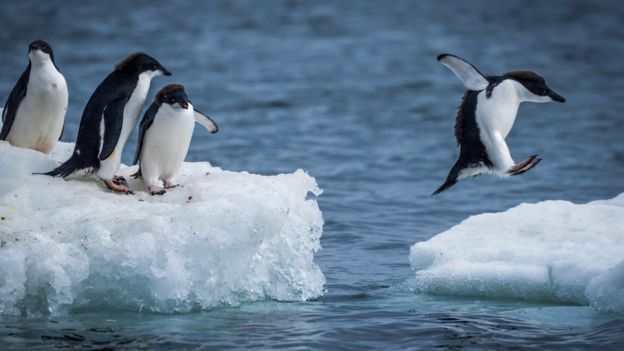 Getty Images
Getty Images
Other rubbish that can't be recycled is sent to landfill in the Falkland Islands, together with used clothes that are given to charity.
Everything else returns to the UK, where French resource management firm Veolia takes over.
Once the waste is unloaded onto the quayside at a port, staff check and package the waste, then load it into vehicles.
Recyclables are sent to one of Veolia's material recovery facilities, while hazardous waste is segregated at Stewartby transfer station, 50 miles north of London, before being treated at a specialist site.
Veolia estimates that in 2017, it collected approximately 61 tonnes of waste from BAS, and 93% of it was recycled.
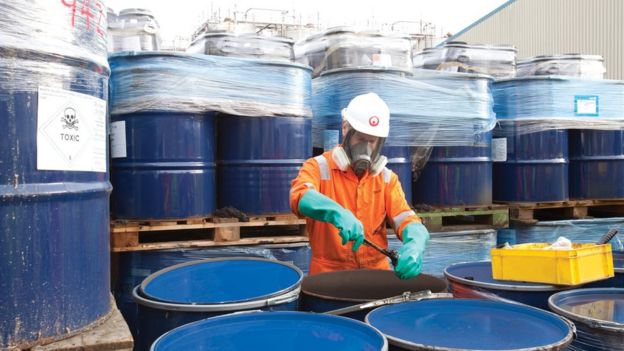 Veolia
Veolia
BAS has six research stations in total. In addition to the three in Antarctica, it has two in the British Overseas Territory of South Georgia and the South Sandwich Islands, and one on Norway's Svalbard islands, in the Arctic Circle.
Back in Antarctica there are no less than 163 facilities overall, 15 of which belong to the US.
Its largest, McMurdo Station, houses 850 people in the summer season.
According to the US Antarctic Program, in 2014 its waste department recycled 65% of all waste coming out of McMurdo and its other Antarctic locations.
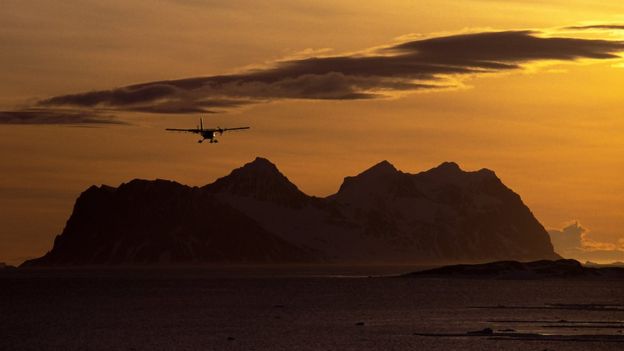 Getty Images
Getty Images
At Rothera, whether you're a scientist, engineer, builder, mechanic, plumber, field assistant, electrician or member of the station management team, everyone has to pitch in and carry out multiple roles.
The station staff work six days a week, but in the summer after the work is done, they spend the evenings skiing, snowboarding, climbing mountains or observing nature. However, it is drummed into them that they must preserve the environment in which they work.
Mr Nelson, who ranks the Antarctic as one of his favourite places in the world, says: "Five metres is the closest we can get to any animal.
"It's quite funny, but if an Adelie penguin gets close to you, often you're the one running away from a tiny penguin."

Comments
Post a Comment